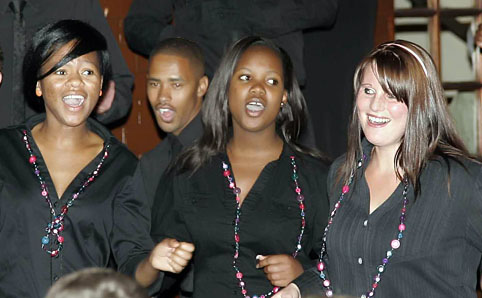Latest News Archive
Please select Category, Year, and then Month to display items
05 June 2018
Photo Supplied
 Archaeological excavations in the Wonderwerk Cave, north of Kuruman in the Northern Cape.
Archaeological excavations in the Wonderwerk Cave, north of Kuruman in the Northern Cape.
Research fellow Dr Lloyd Rossouw from the Department of Plant Sciences at the University of the Free State (UFS) recently published an article in the Nature Ecology and Evolution journal with Dr Michaela Ecker from the University of Toronto as lead author, and Dr James Brink, research fellow at the UFS Centre for Environmental Management. The findings described in “The palaeoecological context of the Oldowan-Acheulean in southern Africa” provides the first extensive paleoenvironmental sequence for the interior of southern Africa by applying a combination of methods for environmental reconstruction at Wonderwerk Cave, which have yielded multiple evidence of early human occupation dating back almost two million years ago.
Where water once was
The Wonderwerk Cave is found north of the Kuruman hills (situated in Northern Cape) a 140m long tube with a low ceiling. The surroundings are harsh. Semi-arid conditions allow for the survival of only hardy bushes, trees, and grasses. But during the Early Pleistocene, stepping out of the Wonderwerk Cave you would have been greeted by a completely different site, the researchers found. Using carbon and oxygen stable isotope analysis on the teeth of herbivores (Dr Ecker), fossil faunal abundance (Dr Brink), as well as the analysis of microscopic plant silica remains (phytoliths) excavated from fossil soils inside the cave (Dr Rossouw), the results show that ancient environments in the central interior of southern Africa were significantly wetter and housed a plant community unlike any other in the modern African savanna.
What difference does it make?
While East African research shows increasing aridity and the spread of summer-rainfall grasslands more than a million years ago, the results from this study indicate an interesting twist. During the same period, shifts in rainfall seasonality allowed for alternating summer and winter-rainfall grass occurrences coupled with prolonged wetlands, that remained major components of Early Pleistocene (more or less the period between one and two million years ago) environments in the central interior of southern Africa. That means our human ancestors were also living and evolving in environments other than the generally accepted open, arid grassland model.
University of the Free State Choir mesmerises its audience
2011-10-31
 |
| Photo: Johan Roux |
The University of the Free State Choir enchanted its audience during a special performance on the Bloemfontein Campus recently. The choir, under the direction of Corné van Pletzen, performed works by, among others, Giacomo Puccini, Allen Pote and Ola Gjeilo. Songs in Sesotho, Setswana and Xhosa, arranged and conducted by Bonisile Gcisa, ensured that the evening had a well-rounded ending.
"The choir is a proud asset and valued component of what this treasured place of higher learning holds dear – the highest standards for human and academic endeavour. It projects in its membership and its repertoire those powerful messages of inclusion and embrace, of hope and healing, in our troubled land and it represents the highest standards of music in our country and beyond," said Prof. Jonathan Jansen, Vice-Chancellor and Rector of the UFS, after the performance. Prof. Jansen thanked Mr Van Pletzen and his team for their outstanding leadership as well as the students in the choir for understanding how important the choir is to Kovsies and its broader messages of excellence and embrace.
The Sentraal Secondary School choir performed a song with the University Choir which was composed by Mr Van Pletzen.